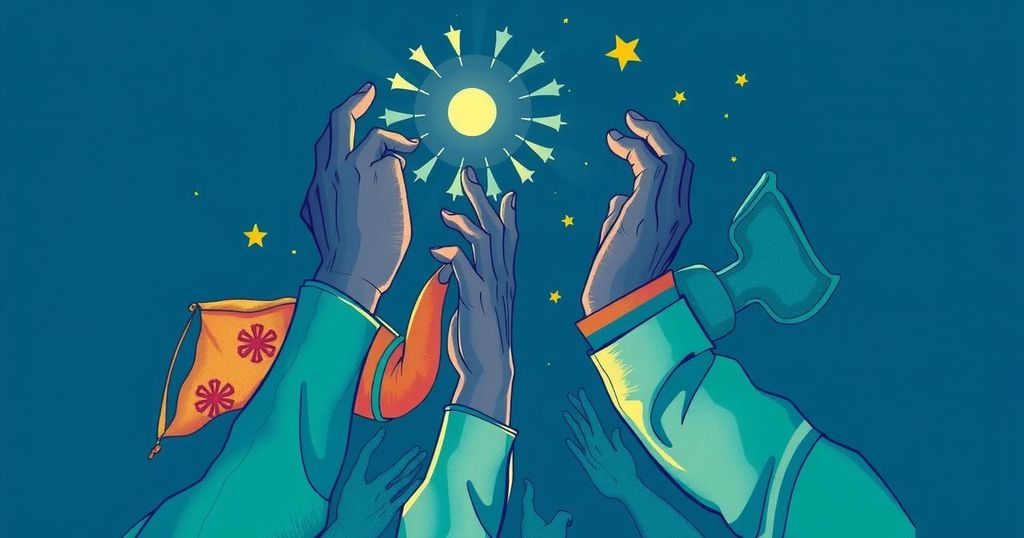Ndigbo Should Reflect on Nigeria’s Democratic Journey – Lawyer
Lawyer Sir Ifeanyi Ejiofor calls for reflection among the Ndigbo as Nigeria marks 25 years of democracy and two years under President Bola Tinubu’s administration. He emphasizes that democracy must serve the marginalized, not just the elite. Ejiofor urges the community to organize and reclaim dignity, facing oppression with peaceful determination.
In a recent statement, Sir Ifeanyi Ejiofor, a prominent human rights lawyer and counsel for the Indigenous People of Biafra, called for deep reflection among the Ndigbo community. As Nigeria marks 25 years of democratic rule and two years under President Bola Tinubu’s leadership, he urged the people to reconsider their positions and actions in the current political landscape. It is vital, he suggested, for the Igbo to rethink and rally around their identity and demands in these times.
Ejiofor emphasized that democracy should extend beyond mere slogans and elections. He argued that it must truly address the needs of marginalized and oppressed populations, not just cater to the interests of the elite. He officially expressed this sentiment in his statement titled, “25 years of civil rule, two years into a new dispensation: A time to reckon, rethink, and reawaken – From a Biafran Lens” shared with media in Awka, Anambra State.
The lawyer criticized the existing political elite who are supposed to protect citizens but instead perpetuate oppression and suppression. He claimed that citizens do not feel safe or secure, highlighting that Nigeria’s progress is stunted as long as it keeps some of its most vibrant individuals suppressed. It is, he said, essential for the Ndigbo to take action, organize, and reclaim their dignity in a peaceful and lawful manner.
Ejiofor further questioned, “As Nigeria marks 25 years of uninterrupted civil rule, we must look beyond official ceremonies and scripted rhetoric. For the Biafran people, especially the Igbo nation, this is not a time for celebration, but for sober reflection.” He continued to unpack the painful contradictions of a democracy that often excludes and vilifies those who seek justice, fairness, and self-determination.
He posed critical questions to the community: “Have the fruits of democracy truly reached Alaigbo? Are our people feeling protected or persecuted? Are we thriving in this federation, or merely surviving?” These queries pointed to broader concerns about the South-East region, riddled with military aggression, economic challenges, and political marginalization.
He lamented the state of violence and insecurity experienced by the South-East populace, stating that peace had devolved into a privilege rather than a right. Ejiofor asserted that those expected to provide security have become sources of fear instead. He pushed for a democracy that encompasses the rights and voices of all the people, particularly the Biafrans.
“Is Nigeria a true union of equal nations, or a forced arrangement with dominant regions? Can we have unity devoid of justice?” he asked. According to him, democratic ideals must also address the plight of marginalized groups and not merely serve the exclusionary goals of a few.
Ejiofor asserted that democracy should honor every region’s dignity and uphold the rights of every person. “Let us raise our voices and values to demand a system that respects each tribe and tongue. Our children must not inherit the silence of oppression, as democracy flourishes in truth, not fear,” he said.
In closing, he remarked, “Nigeria cannot rise while it keeps some of its brightest citizens on their knees. This is the time for action and reflection. To recognize June 12 is to acknowledge the dangers of silence. We must strive for a federation built on fairness, or the freedom to construct our destiny,” insisting that the voice of Biafra must not be extinguished. The struggle, he concluded, continues by choice, not by chance.
Sir Ifeanyi Ejiofor’s statement serves as both a critique of Nigeria’s current democratic framework and a call to action for the Ndigbo. He stresses the need for reflection on the past 25 years of democracy; urging awareness of the ongoing struggles faced by marginalized groups. Through his pointed questions, he highlights the pressing need for justice and equality within the nation’s political landscape while insisting that the fight for Biafran rights must persist.
Original Source: punchng.com




Post Comment